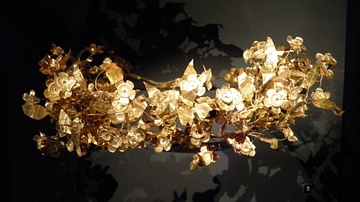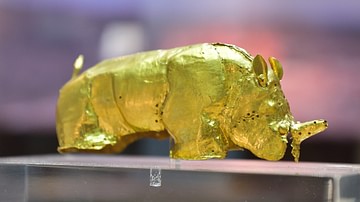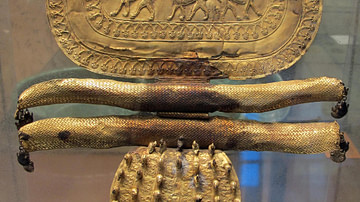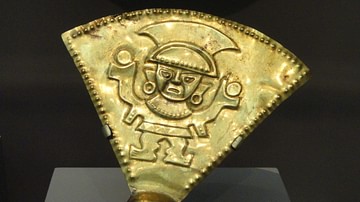Search
Search Results

Image
Inca Gold Female Figurine
A gold female figurine from the Inca civilization, 15-16th century CE, Peru. Height 15 cm. Such precious figures were typically buried with important people. (The Metropolitan Museum of Art, New York)

Image
Gold Myrtle Wreath
Gold myrtle wreath from Macedonia, 4th century BCE. A religious symbol, also indicating social position, it was worn at public appearances, religious ceremonies and symposia, and accompanied its owner to the grave. Archaeological Museum...

Image
Gold Rhinoceros, Mapungubwe
A gold rhinoceros from a burial site at Mapungubwe, South Africa. 11-14th century CE. (University of Pretoria Museums, South Africa)

Image
Gold Ring from Mycenae
A Mycenaean gold ring depicting a hunting scene. From Grave Circle A, Mycenae, 16th century BCE. (National Archaeological Museum, Athens)

Image
Etruscan Gold Fibula, Cerveteri
A gold fibula decorated with five lions (upper portion) and 50 ducks (lower portion) from the Etruscan Regoliini-Galassi Tomb at Cerveteri. 7th century BCE. (Museo Gregoriano Etrusco, Vatican Museums, Rome)

Image
Apollo, Macedonian Gold Stater
Macedonian gold stater, 359-336 BCE.
Obverse: Apollo
Reverse: Charioteer
Alpha Bank Numismatics Collection, Kerkyra, Corfu.

Image
Macedonian Gold Stater
Macedonian gold stater from the reign of Philip II, 359-356 BCE. O: Head of Apollo. R: Charioteer driving a racing biga.

Image
Mycenaean Gold Jewellery Pieces
Strings of gold beads in the form of rosettes, papyrus and lillies from Mycenae area (14th century BCE). Nafplio Archaeological Museum.

Image
Seekers of the Seven Cities of Gold
Artist's impression of how Coronado's expedition may have looked, titled "Seekers of the Seven Cities of Gold, Coronado in the Chiricahaus".

Image
Chimu Gold Rattle
A Chimu gold rattle, 1100-1470 CE. The figure, with earspools and headdress, represents a member of the Chimu ruling class and was a common motif in Chimu art. (Art Institute of Chicago)